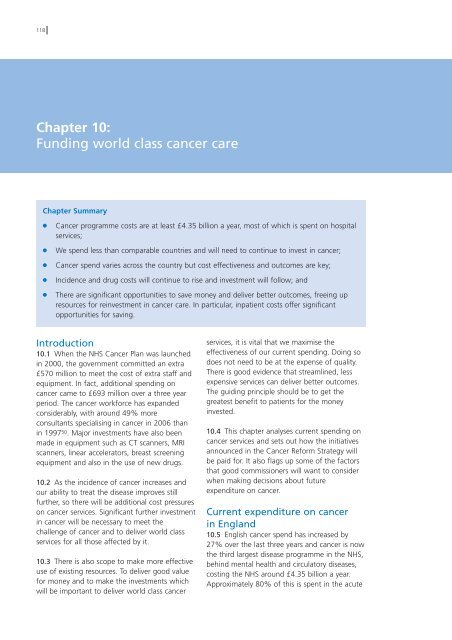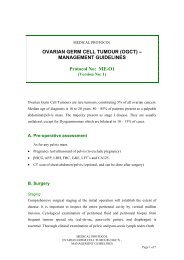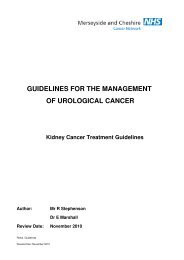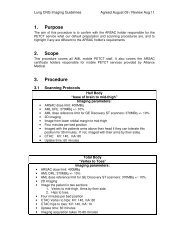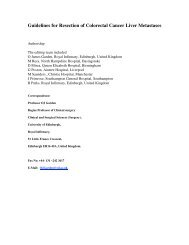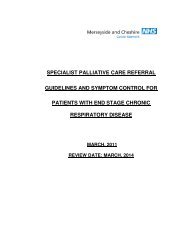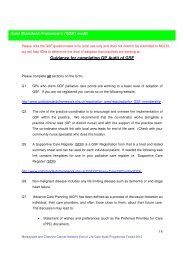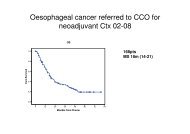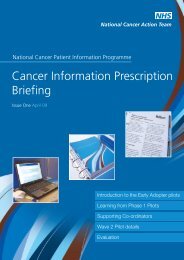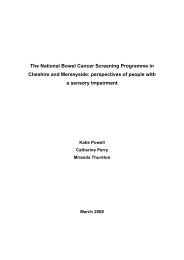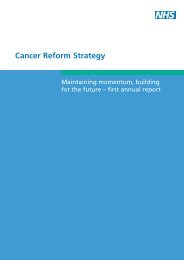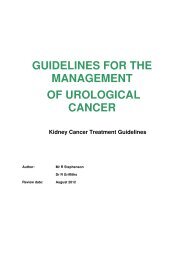Cancer Reform Strategy - NHS Cancer Screening Programmes
Cancer Reform Strategy - NHS Cancer Screening Programmes
Cancer Reform Strategy - NHS Cancer Screening Programmes
- No tags were found...
You also want an ePaper? Increase the reach of your titles
YUMPU automatically turns print PDFs into web optimized ePapers that Google loves.
118Chapter 10:Funding world class cancer careChapter Summary●●●●●<strong>Cancer</strong> programme costs are at least £4.35 billion a year, most of which is spent on hospitalservices;We spend less than comparable countries and will need to continue to invest in cancer;<strong>Cancer</strong> spend varies across the country but cost effectiveness and outcomes are key;Incidence and drug costs will continue to rise and investment will follow; andThere are significant opportunities to save money and deliver better outcomes, freeing upresources for reinvestment in cancer care. In particular, inpatient costs offer significantopportunities for saving.Introduction10.1 When the <strong>NHS</strong> <strong>Cancer</strong> Plan was launchedin 2000, the government committed an extra£570 million to meet the cost of extra staff andequipment. In fact, additional spending oncancer came to £693 million over a three yearperiod. The cancer workforce has expandedconsiderably, with around 49% moreconsultants specialising in cancer in 2006 thanin 1997 50 . Major investments have also beenmade in equipment such as CT scanners, MRIscanners, linear accelerators, breast screeningequipment and also in the use of new drugs.10.2 As the incidence of cancer increases andour ability to treat the disease improves stillfurther, so there will be additional cost pressureson cancer services. Significant further investmentin cancer will be necessary to meet thechallenge of cancer and to deliver world classservices for all those affected by it.10.3 There is also scope to make more effectiveuse of existing resources. To deliver good valuefor money and to make the investments whichwill be important to deliver world class cancerservices, it is vital that we maximise theeffectiveness of our current spending. Doing sodoes not need to be at the expense of quality.There is good evidence that streamlined, lessexpensive services can deliver better outcomes.The guiding principle should be to get thegreatest benefit to patients for the moneyinvested.10.4 This chapter analyses current spending oncancer services and sets out how the initiativesannounced in the <strong>Cancer</strong> <strong>Reform</strong> <strong>Strategy</strong> willbe paid for. It also flags up some of the factorsthat good commissioners will want to considerwhen making decisions about futureexpenditure on cancer.Current expenditure on cancerin England10.5 English cancer spend has increased by27% over the last three years and cancer is nowthe third largest disease programme in the <strong>NHS</strong>,behind mental health and circulatory diseases,costing the <strong>NHS</strong> around £4.35 billion a year.Approximately 80% of this is spent in the acute


